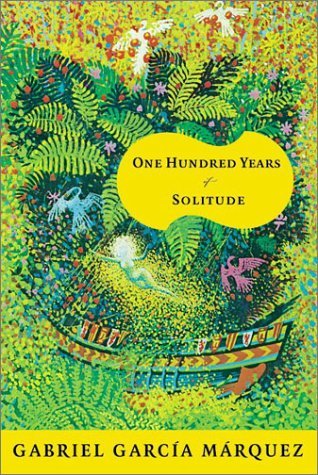 One Hundred Years of Solitude
One Hundred Years of Solitude(1967)
Written by Gabriel García Márquez
Translated by Gregory Rabassa
One Hundred Years of Solitude is a simple idea for a book. There is a village, an isolated village, located in the forests of South America, possibly on an island in the Caribbean; if the book ever specified where it was, I missed the cue, but maybe I'll pick it up the second time around.
This village, when the book starts out, is relatively young, having been founded within the last ten years before the book picks up. Macondo, it is called. The village was founded by José Arcadio Buendía, husband of Úrsula Iguarán, and within Macondo, while the Buendía family are by no means rulers, they do serve as figureheads, as community leaders. The town operates without government interference, and is fairly detached from the world, save for the annual arrival of the gypsies, who bring with them the wonderments of the modern world.
From there, the book follows one hundred years of the Buendía family, and through them, it tells the story of Macondo, and it tells the story of the world in microcosm. This is an astonishing accomplishment, this book. I will try my best not to give into hyperbole, to use words like "amazing" or "wondrous," without really meaning them, as empty use of those terms would do this book a great disservice. Just know, when I use those words here, I really mean it. One Hundred Years of Solitude is one of those rare pieces of art which make me pause, and reconsider all other books I've read previously, and finding myself amazed at how few could come close to standing in its company; there aren't any I've read which could equal it, certainly. It has, in effect, caused me to reconsider my standards.
The themes tackled are too large to go into here. I certainly couldn't do them justice, and so I will not attempt to. The story is a grand tapestry, following dozens (somewhere in the neighbourhood of three-dozen at last count) of characters across a hundred years. The strength of narrative style lies in its po-faced nature. Nothing shakes the voice. No detail is any more miraculous than any other, which is the point. There are many moments of magic throughout this novel. My favourite involves two twins, one of whom takes a sip of some lemonade, only for the other to announce, with no communication between the two, that it "needs sugar." Magic is a major theme of this book, and the way it is woven in and out of the daily lives of the Buendía family is touching and delightful.
The translation by Rabassa is tremendous, and it serves as a credit to both García Márquez and Rabassa that the work holds up so well. Many books are not served well by the translation process; One Hundred Years of Solitude has not had, to my knowledge, a new translation in the forty years since it was first published, and it will never need one. Rabassa's work is perfection, the flow of the language and the glories of the descriptions have been preserved. There is a moment where García Márquez writes of looking up at the stars in the day time sky that rust has let through a zinc roof; I read the sentence a few times, taking in how perfect a description of an old zinc-plate roof it is.
There are a lot of things I want to tell you about this book, but I'll stop here. It is a book I am glad I did not read in high school; I would not have read it with the same attention I gave it here, and I would have dismissed it. Having read it now, of my own volition, and giving it my total, willing focus, I cannot wait to read it again in a year or so. It took García Márquez eighteen months of poverty to write One Hundred Years of Solitude; it was unquestionably worth it.
Grade: A+

1 comment:
I kind of skimmed this (that is to say read the first half and final paragraph)but I should say that If you haven't read Jeffery Eugenides Middlesex, you might want to do that. It seems to be following in a notable enough way (follows three generations), and it's one of my favorite novels.
Post a Comment